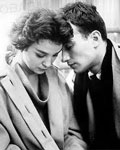
Directed by
John Cassavetes
87 minutes
Rated M
Reviewed by
Bernard Hemingway

Shadows
John Cassavetes' Shadows, his first effort as a writer/director, is far from being a great film dramatically, rambling on its way in fits and starts, but it is of interest on three principal levels.
Firstly, as a pioneering work of American independent cinema, secondly as the seed bed of the interests that inform the director’s most significant later work, and thirdly as a wonderful cameo of late 50s American beat style.
Technically rough, much of it filmed on the fly with available sound and lighting, Cassavetes shot 30 hours of footage of the often self-conscious improvisations of a group of young actors he regularly worked with and built it into a cinema verité account of the lives of a no-doubt similar group of young New York bohemians exploring the new freewheelin’ post-war values and lifestyle – jazz music, drugs, sex, inter-racial relations and so on, in what is a kind of precursor to Andy Warhol’s films 10 years later (Ben Carruthers, who plays the main character looks remarkably like Lou Reed).
Although the essence of Cassavetes' artistic mission, to shine light on the human need and struggle for love, is exemplified well here Cassavetes would find his feet formally with Faces (1968) by paring away the descriptive, extra-mural passages and working with more experienced actors. As an inaugural attempt, however, and as a document of its time, this is well worth checking out.
FYI: Apparently Cassavetes re-shot and re-edited the film substantially after its first public screening in late 1958 in order to give it more coherence for its New York theatrical release in March 1961, a month after Godard’s Breathless although without anything like the French director's success.
Want something different?





